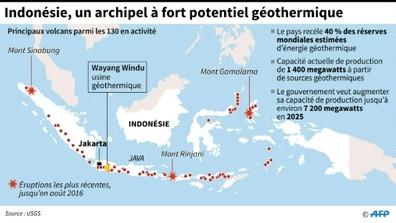The impact of Tri Mumpuni on renewable energy
Tri Mumpuni, an iconic figure in renewable energy in Indonesia, has transformed the country’s energy landscape through her unwavering commitment. She is known for developing micro-hydropower projects that have brought electricity to isolated villages in Indonesia.
Mumpuni’s contributions go beyond simply providing cutting-edge technologies. She is also dedicated to empowering local communities by giving them the opportunity to manage their own energy resources. This has created a sustainable and replicable model that helps reduce dependence on fossil fuels.
One notable aspect of her approach is her attention to the social impact of her projects. She is committed to including women and youth in her initiatives, providing them not only with access to electricity but also with employment and training opportunities.
Among her significant achievements:
- The installation of more than 60 micro-hydropower systems in remote areas.
- The training of thousands of community members for the management of installations.
- A close cooperation with NGOs and governments to promote sustainable energy policies.
The scope of Mumpuni’s work extends beyond Indonesian borders. Her expertise is sought in other developing countries, where she shares her technological innovations and community-centered approach.
Tri Mumpuni’s work is an inspiring example of how local initiatives can have a global impact. Her dedication to the cause of renewable energy illustrates the importance of sustainable solutions in the fight against climate change and in the quest for a cleaner energy future.
An innovative vision for Indonesia
Tri Mumpuni is an iconic figure in the field of renewable energy in Indonesia. As the founder of the Institute for Alternative Energy Development in Indonesia (IBEKA), she has revolutionized how rural communities access electricity. She has managed to provide sustainable solutions by leveraging local natural resources, notably micro hydropower plants.
Tri Mumpuni’s work focuses on harnessing hydropower to provide electricity to isolated areas. Thanks to her initiatives, over 60 micro-hydropower plants are now in operation, providing clean and reliable energy to thousands of households. These projects not only provide electricity; they also foster local economic development by creating jobs and improving infrastructure.
Tri Mumpuni’s vision for Indonesia is to expand access to renewable energy across the country. She firmly believes that Indonesia’s natural resources, such as rivers, can be effectively utilized to promote sustainable development. Her goal is not only to meet energy demand but also to reduce reliance on fossil fuels.
To realize this vision, she adopts a collaborative approach that involves local communities at every stage of the projects. This community involvement ensures the sustainability of the projects and encourages the empowerment of residents, thus contributing to their training and development.
The initiatives and vision of Tri Mumpuni have significantly impacted energy policies in Indonesia. Her work has been recognized internationally, and she has received several awards for her outstanding contributions to the renewable energy sector. She continues to inspire others to work toward a more sustainable future.
- More than 60 micro-hydropower plants in operation
- Access to electricity for thousands of households
- Job creation in rural areas
- Improvement of local infrastructure
- Reduction of dependence on fossil fuels
Promoting access to sustainable energy
Tri Mumpuni is an iconic figure in the field of renewable energy in Indonesia. Through her initiative, she has transformed several rural villages into models of energy sustainability. Her main goal is to provide sustainable energy solutions to isolated communities, enabling them to achieve energy independence.
Tri Mumpuni has implemented innovative projects, including micro-hydropowers, that utilize local water resources to generate electricity. These initiatives have not only reduced dependence on fossil fuels but have also led to a significant decrease in CO2 emissions. The benefits do not stop there: they have enabled local job creation and economic growth for communities.
For Tri Mumpuni, access to sustainable energy is a fundamental right. She works in collaboration with various organizations and governments to promote the adoption of green technologies. Her efforts focus on:
- Educating and training local communities on renewable energy technologies.
- Developing partnerships to finance and support sustainable energy projects.
- Implementing energy solutions tailored to the needs and resources of each community.
Through her hard work, Tri Mumpuni inspires many professionals and enthusiasts in the renewable energy sector around the world. Her commitment to a sustainable energy future is a model of resilience and determination.
Flagship projects of Tri Mumpuni

Tri Mumpuni is a key figure in the field of renewable energy in Indonesia. Known for her unwavering commitment, she has distinguished herself through innovative projects and a vision focused on a more sustainable future.
Tri Mumpuni has initiated and developed several landmark projects throughout her career. Among these, the micro-hydropower project in remote Indonesian villages stands out particularly. This project has provided electricity to thousands of households that were previously without it. It relies on technical solutions utilizing local hydropower resources, making energy accessible and sustainable.
Another notable project is the development of solar power plants in rural areas. These plants contribute not only to rural electrification but also to reducing dependence on fossil fuels. They are also a means to promote energy autonomy for local communities.
She has also been involved in biomass initiatives, aimed at converting agricultural waste into energy. This project underscores the importance of waste management and the integration of clean technologies to produce electricity while reducing environmental impact.
Tri Mumpuni’s actions clearly demonstrate that innovation and determination are essential drivers for the development of renewable energy in Indonesia. Through her initiatives, she has not only brought electricity to isolated regions but has also raised awareness and mobilized entire communities around environmental causes.
Hydropower: A model for the community
Tri Mumpuni is an iconic figure in the field of renewable energy in Indonesia. She has focused her efforts on implementing community-based hydropower projects, demonstrating that an inclusive and sustainable approach can transform entire regions.
Among her many achievements, two projects stand out particularly:
- The development of micro-hydropower plants in remote villages.
- The creation of community electricity distribution networks.
These initiatives have not only brought electricity to thousands of households but have also encouraged local economic development.
The micro-hydropower plants designed by Tri Mumpuni follow a unique model centered on community participation. Local communities are involved from the outset, ensuring the sustainability and acceptance of the projects.
This model presents several benefits:
- Empowerment of local communities: Residents are trained to manage and maintain the installations, thus reducing external dependency.
- Economic development: Access to a reliable energy source stimulates economic activity, creating new job and entrepreneurship opportunities.
- Environmental sustainability: The use of renewable energy sources preserves the environment and reduces greenhouse gas emissions.
This community hydropower model has become an example to follow for other regions and countries, highlighting the importance of inclusivity and sustainability in renewable energy projects.
Solar Power: Lighting up rural areas
Tri Mumpuni is an iconic figure in Indonesia in the field of renewable energy. Through her innovative vision and dedication, she has significantly contributed to the electrification of rural areas through micro-hydropower and solar projects. Her work has not only improved the quality of life for residents but has also promoted sustainable and autonomous development.
One of the most remarkable projects of Tri Mumpuni is the Small Hydropower Initiative (Micro Hydro Power). This program aims to harness the hydropower of local rivers to produce electricity. It has enabled entire villages to be powered while preserving the environment. By involving local communities in the management and maintenance of these infrastructures, the project has also strengthened their energy independence.
Solar Power represents another key development focus for Tri Mumpuni. In Indonesia, where access to electricity is uneven, solar energy offers an effective solution for isolated rural areas. Through the installation of solar panels and storage batteries, these regions benefit from a reliable and renewable energy source.
Here are some advantages of Tri Mumpuni’s solar projects:
- Reduction of dependence on fossil fuels
- Improvement of quality of life for residents
- Creation of local jobs for the installation and maintenance of solar systems
- Education of communities on the benefits of renewable energies
By focusing on sustainable technologies and involving local communities, Tri Mumpuni continues to play a crucial role in Indonesia’s energy transition.
The future of renewable energy in Indonesia

Tri Mumpuni is a true pioneer of renewable energy in Indonesia. For years, she has actively worked to bring sustainable and innovative solutions to her country. Armed with a background in engineering and an unwavering passion for the environment, she has paved the way for numerous micro-hydropower projects.
With her organization, IBEKA (Institute for the Development of Energy and Community Initiatives), Tri Mumpuni has facilitated the electrification of over 60 villages in Indonesia. These projects do not just provide clean energy; they also create economic and social opportunities for local communities.
Tri Mumpuni’s projects primarily focus on utilizing water and sunlight, resources abundantly available in the Indonesian archipelago. The emphasis is on solar energy production and the installation of small hydropower plants, adapting these technologies to the environmental and cultural specifics of each region.
Among the advantages of IBEKA’s micro-hydropower plants are:
- Reduction of greenhouse gas emissions
- Continuous energy supply for homes and businesses
- Creation of local jobs and economic development
- Improvement of the quality of life for isolated communities
Tri Mumpuni’s approach may well offer an enticing perspective for the future of renewable energy in Indonesia. The country, rich in natural resources, has the potential to become a leader in alternative energy. Technological innovation and community participation will play a crucial role in achieving this goal.
As the Indonesian government increasingly commits to energy transition policies, initiatives like those of Tri Mumpuni show the way. By combining technical expertise, local participation, and sustainability, these projects illustrate the immense possibilities offered by renewable energies for a cleaner and more equitable future.
The challenges ahead for a successful transition
Tri Mumpuni is an iconic figure in the field of renewable energy in Indonesia. For over two decades, she has devoted her career to establishing sustainable energy solutions in her country’s rural areas. A self-taught individual, she began by working on micro-hydropower projects aimed at bringing electricity to isolated villages.
Through her innovative approach, Tri has successfully installed several hundred micro-hydropower projects, providing clean and accessible energy to thousands of households. By collaborating with local NGOs and international organizations, she demonstrates that green technologies can be tailored to meet the specific needs of local communities.
The future of renewable energy in Indonesia is promising, but there are still many challenges to overcome. In the vast and diverse Indonesian archipelago, geographical and climatic variations pose significant obstacles. However, initiatives like Tri’s show that sustainable and local solutions can be successfully developed.
For this energy transition to be successful, it is crucial to address several challenges:
- Policy and regulation: A clear and favorable legislative framework for renewable energies is necessary to encourage investments and innovations.
- Funding: Securing the necessary funds for large-scale projects remains a major obstacle. Innovative funding mechanisms and government support are essential.
- Education and awareness: Successful projects require understanding and acceptance by local communities. Therefore, awareness and training efforts are indispensable.
- Adapted technologies: Develop and adapt renewable energy technologies to meet local specificities, whether in bioenergy, solar, or wind.
By overcoming these challenges, Indonesia can not only achieve its sustainable development goals but also become a model for other developing countries wishing to embrace green energies.
Drawing inspiration from Tri Mumpuni’s model for other countries
Tri Mumpuni is an iconic figure in the field of renewable energy in Indonesia. Engaged for decades, she has successfully promoted innovative solutions in micro-hydropower to power the rural areas of the country. Her work has transformed the lives of many communities by providing them with reliable access to clean electricity.
Through her efforts, several micro-hydropower projects have been implemented, allowing not only the production of electricity but also the strengthening of local capacities. These initiatives have led to a significant improvement in the quality of life for residents while reducing dependence on fossil fuels.
The success of Tri Mumpuni is based on several key factors:
- Close collaboration with local communities to ensure sustainable management of resources.
- Integration of local actors in the planning and implementation process.
- Training of local technicians to guarantee the maintenance and operation of infrastructures.
In Indonesia, the future of renewable energy looks promising. The country has significant potential in solar, geothermal, and marine energies. Initiatives like those of Tri Mumpuni can serve as a model for other regions wishing to sustainably exploit their natural resources.
Other countries can draw inspiration from Tri Mumpuni’s model to develop their own micro-hydropower systems. By adopting a participatory approach and valuing local resources, these projects can not only provide clean energy but also stimulate economic development and strengthen community resilience to environmental challenges.
Tri Mumpuni’s actions show that with determination and a clear vision, it is possible to make significant and lasting changes in the field of renewable energy.
“`
Articles similaires
Thank you!
We will contact you soon.














